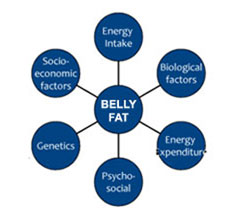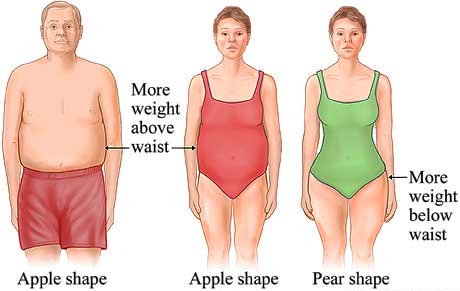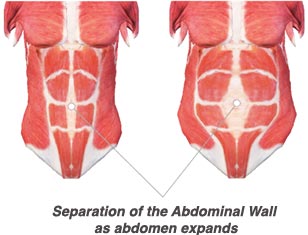Causes of Belly Fat
 GENETICS/ GENDER
GENETICS/ GENDER
Where you gain fat and how easy it is to lose belly fat is partly down to genetics. Our genes help determine how many fat cells we have and where these fat cells are stored. Most men preferentially deposit fat in their abdominal area, this is due to the action of male hormone testosterone. The stress hormone, cortisol also encourages belly fat. Women tend to deposit fat on the hips, thighs and buttocks, which is down to the effects of the female hormone, estrogen. For this reason, a woman’s body shape changes and belly fat increases after the menopause when estrogen levels decrease. Though men tend to have more belly fat than women, men generally lose belly fat faster as a result of regular exercise.
BODY SHAPE
Your body shape also affects how easily you lose belly fat:
- Pear-shaped: smaller upper body than lower body. You will find it easier to boast flat, defined abs, as the hardest place for you to lose body fat is from the lower body. The easiest place to lose weight is from your upper body.
- Inverted-triangle: bigger upper body than lower body. You carry most of your fat in your trunk and arms. Therefore, losing belly fat is harder and achieving low level of body fat in the abdomen more difficult. Also, this body shape is the most likely to have high levels of deep belly fat (visceral fat). For this reason, losing belly fat is particularly important.

FAT BELLY
Basically this is caused by eating the wrong foods, consuming too many calories and/ or insufficient exercise. You probably also are carrying extra weight around your hips and legs. Losing belly fat is pretty straightforward, but does require a lifestyle overhaul. You need to implement a diet that will help you lose belly fat and regular exercise to burn fat and strengthen your abs. Read about which foods you should be avoiding and which ones will help you quickly lose that belly.
STRESS BELLY
The stress hormone known as cortisol, promotes fat to be deposited in the belly area. High levels of cortisol are linked with greater amounts of belly fat. Alcohol, smoking and caffeine all increase cortisol levels. Read more about which type of diet will help reduce cortisol levels.
POST-PREGNANCY BELLY
Post pregnancy the uterus is heavier than pre-pregnancy causing the uterus to drop. The uterus does return to its pre-pregnancy size, but takes about 6 weeks to do so. Also, pregnancy splits the abdominal muscles (the linea alba muscle separates) down the middle. Therefore, it’s not even worth thinking about aiming for flat abs until that process is  complete and stay clear of crunches, as they will force these muscles farther apart. Don’t rush into exercising, give yourself at least 2 – 3 months before exercising to get back into shape. Always speak to your doctor or midwife before starting an exercise program, particularly if you’ve had a caesarean section. It is essential to ensure your abdominal muscles have healed before starting vigorous exercises.
complete and stay clear of crunches, as they will force these muscles farther apart. Don’t rush into exercising, give yourself at least 2 – 3 months before exercising to get back into shape. Always speak to your doctor or midwife before starting an exercise program, particularly if you’ve had a caesarean section. It is essential to ensure your abdominal muscles have healed before starting vigorous exercises.
To get back your pre-pregancy body, you need re-train and strengthen your pelvic floor muscles and your deepest tummy muscle layer (transversus abdominus). The pelvic floor muscles help to stabilize the pelvis and support the organs of the lower abdominal cavity, including the bladder and uterus. Pelvic floor strengthening exercises known as Kegels (named after Dr. Kegel) generally recommended for strengthening the pelvic floor. The transversus abdominus is a deep abdominal muscle and acts as a corset, pulling you in. Exercises targeting the transversus abdominus will help to strength your core and flatten your belly, by pulling it in from the inside out.
BLOATED BELLY
You know you have a bloated belly, if it starts off relatively flat in the morning, but grows larger throughout the day with gas or indigestion. Bloating can affect you irrespective of size, you may be slim or overweight. Your belly may be bloated due to food intolerances, sluggish bowels as a result of a poor diet or a relatively unknown, but probably common condition called Small intestinal bacterial overgrowth (SIBO). SIBO is when there are abnormally high levels of bacteria in the small intestine, especially the type of bacteria usually found in the colon (large intestine) than the small intestine. Basically, there are two problems (1) too much bacteria and (2) the wrong type of bacteria in the wrong place. The symptoms of SIBO include excess gas, abdominal bloating and distension, diarrhea (less frequently constipation) and abdominal pain. It is thought that many people labelled with Irritable Bowel Syndrome (IBS), are in fact suffering with SIBO.
FACTORS THAT CAN INCREASE BELLY FAT
There are several factors that increase the likelihood of developing excess deep belly fat, including:
• Male gender
• Post-menopausal women
• Obesity
• Sedentary lifestyle
• Smoking
• Heavy drinking (3 or more drinks per day for men, 2 or more drinks for women)
• Chronically high stress levels
• Poor diet, particularly if high total fat, saturated fat and refined carbohydrates.
Click to see references
- Prev:Belly Fat Health Risks
- Next:How to Lose Belly Fat
-
Healthy And Quick Weight Loss - Ways To Lose Weight In 2 Days
A lot of diet programs or pills promise that people can lose a conside
-
The Perfect Diet And Basic Weight Management
The perfect diet should be combined with
-
The Six Best Fat Loss Supplements Part 2
In part 1 of this article, we explained
-
Dieting The Real Secret
Your Non-Conscious Mind is 98% of your full power.Your Inner Knowing i
-
Hypothyroidism vs. hyperthyroidism symptoms, living with thyroid diseases
Hypothyroidism and hyperthyroidism are two common forms of thy
-
Managing Cravings With EFT
There are several ways to manage cravings. You can: Attempt to stop e
- DON'T MISS
- How To Locate Authentic Review Websites Of Weight Loss Pills?
- Removing Belly Fat: Five Solutions To Destroy The Spare Tire!
- Diet pill approved by NHS although there are health risks
- Glycemic index diet: Whats behind the claims
- Why Anxiety and Stress Might Be Causing Your Weight Gain
- Diabetes Diagnosis Garners Same Reaction as Death
- Isometric Exercise & Proper Breathing Create A Non-Stressful Workout That Yields Results
- Growing Taller Naturally - Stimulate Human Growth Hormones And Enough Sleep®
- Weight Loss Dieting
- 7 Ways To Reach Your Ideal Weight (Especially If Youve Hit A Plateau)




